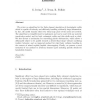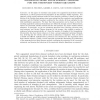36 search results - page 1 / 8 » Can a finite element method perform arbitrarily badly |
MOC
2000
13 years 4 months ago
2000
In this paper we construct elliptic boundary value problems whose standard finite element approximations converge arbitrarily slowly in the energy norm, and show that adaptive proc...
CVGIP
2006
13 years 4 months ago
2006
We review an algorithm for the finite element simulation of elastoplastic solids which is capable of robustly and efficiently handling arbitrarily large deformation. In fact, the ...
SIAMNUM
2010
12 years 11 months ago
2010
Abstract. A variational problem characterizing the density estimator defined by the maximum a posteriori method with Gaussian process priors is derived. It is shown that this probl...
SIAMSC
2008
13 years 4 months ago
2008
In this paper we introduce and analyze two augmented mixed finite element methods for a velocity-pressure-stress formulation of the stationary Stokes equations. Our approach, which...
CVPR
2003
IEEE
14 years 6 months ago
2003
IEEE
This paper presents a method to perform 2D deformable object tracking using the boundary element method (BEM). BEM, like the finite element method (FEM), is a technique to model a...



